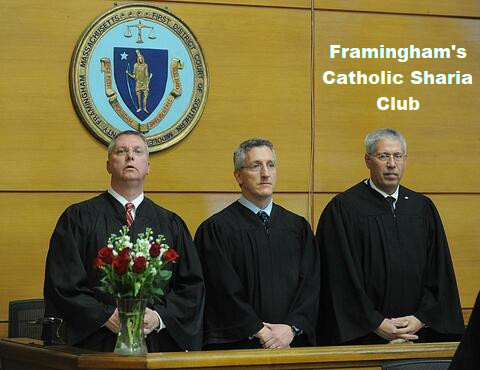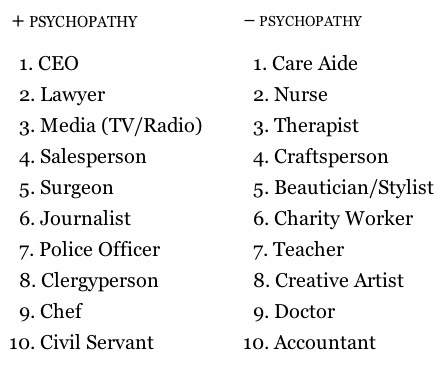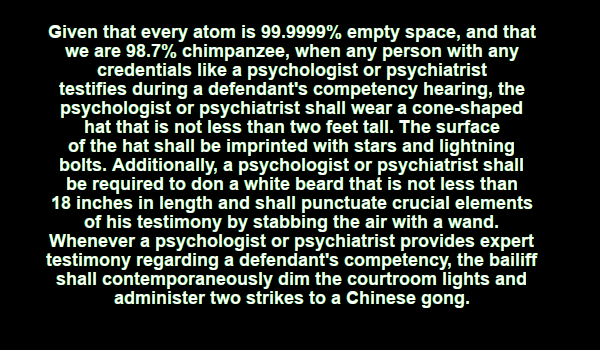
|
A J.D. or Juris Doctorate is what we call a professional doctorate,
similar to the M.D. program for those in the medical profession.
Of course, getting a J.D. only takes two to three years, whereas an
M.D takes four years.
Getting a J.D. allows one to make lots of money off criminal activity, much like cops, judges and prison guards. One must remember, wherever there is law, there is crime . Any lawyer who tells you that crime doesn't pay is merely trying to protect their income stream. Professional doctorates were developed in the United States in the 19th century during a movement to improve the training of professionals by raising the requirements for entry and completion of the degree necessary to enter the profession. These first professional degrees were created to help strengthen professional training programs. The Doctor of Juridical Science (S.J.D.), or Doctor of Jurisprudence (J.S.D.) ("Scientiae Juridicae Doctor" in Latin), and Doctor of Comparative Law (D.C.L.), are research and academic-based doctorate level degrees, comparable to Ph.D. degrees in other fields or doctoral degrees in law in Europe (such as the Dr.iur. degree in Germany). Now, the question to ask is, what is law? What does the average man see of law? I have a Master's Degree in Computer Science from Virginia Polytechnic Institute and State University, and my take on law is that it is a convolution, eviseration, mutiliation, mastication and bastardization of the english language written in such a manner that it can no longer be understood by someone other than a lawyer with a Fischer Price diploma from a law school. I have read books by H.G. Wells and Mark Twain and compare these to various legal documents written by judges and just shake my head in disbelief. How can the english language be so mutiliated, masticated, and bastardized? With great care and hard work. Alcohol and drugs may also play a significant role. I'm quite confident that getting a J.D., like a Theology degree requires several creative writing courses. After all, you write documents that cannot be understood by most good book authors. It gives you the ability to write laws that require one or more courts and other lawyers to interpret what the law meant to say. The more popular examples of the creative writing styles of lawyers can be found in the Terms Of Service (TOS) of a web site you may use or the End User License Agreement (EULA) of a product you allegedly purchased. Take the time to read it, for once in your life, if you dare. These are reminders that lawyers are stunningly full of bullshit. Lawyers did not feel that English was a good language for their nefarious deeds. They then had to invent their own language, called legalese (contains lots of latin phrases), in order to better understand law. The notion that there exists the term lawyerspeak is testament in itself that the english language gets shredded by lawyers. True legalese convolution occurs on some 75 page PDF decisions. Why can't these people write an opinion in ten pages or less. Way too many law schools are ecclesiastical in nature and as such their end products tend to be ecclesiastical. There is that linguistic connection between churches and the courts, it's called latin.

As it turns out, Boston has several law schools that seem to be run by the catholic church. The one I see most in the resume of judges is Boston College Law School, a school run by Jesuit priests and it's motto is: Finding God In All Things. In choosing its candidates, you can bet a large crucifix with a bloody Jesus hanging on your neck will get you a lot of plus points. Lawyers are generally very technically inept. The older the lawyer, the more technically inept they become. Some can barely differentiate a cloud from the cloud. The vast majority of lawyers get their undergraduate degree in some easy peasy subject and generally stay away from science, engineering and technology. I would be extremely surprised if there was a single lawyer in the United States that had a BS in Mathematics or Computer Science. If they dare to think that law school is difficult, I would love to see some of these arrogant little prick lawyers even attempt a Masters degree in Computer Science like I did. Judges almost always used to be assistant DAs and/or state representatives. They learn to schmooze and kiss the asses of their power brokers such that they themselves become power brokers. The judges came from the assistant DA pool in their counties and all meet each other from their attendance at many Christmas parties. A google search of catholic law schools will find that the Catholic Church has been quite busy in maintaining it's hold on society ever since secular governments came to power across the world. The church maintains its power base through the US court system. A google search of lawyer jokes will come back with 14,200,000 entries, indicating what we all know, that there are a gazillion jokes about lawyers. In fact, there are untold thousands of web sites dedicated to jokes about lawyers. You might ask yourself why this field is ridiculed so much. Make crime pay. Become a lawyer.

In case you haven't notice, lawyers and a bunch of old men working in the catacombs of St. Peter's church (the Vatican) both still use latin as a second language. Coincidence? I think not! The notion that both the Catholic church and the legal community both still use latin in the background establishes a strong linguistic connection. It should be clear to intelligent people that the Catholic church has infiltrated the judiciary. Are you familiar with other organizations that still use latin as a second language or have so many latin terms in its langauge? Ex parte means one party gets left out of an important conversation. Pro bono means we'll do it for free Pro se means I'll do it myself, thank you.
Quid pro quo means something for something
Ei incumbit probatio qui dicit, non qui negat is supposed to mean the burden of proof lies with who declares, not who denies but it usually means you're guilty. This is a much longer list of quaint latin terms in the legal community. . Every lawyer (defense attorney, DA or judge) that I have seen allow for the corruption of the courts. Each time the court bailiff (the court security officer, usually a big goon) tells those in attendance in the courtroom to stand up, these lawyers, DAs and judges are knowingly promoting the corruption of the judiciary. There is no law requiring anyone to stand up in order to show respect to the court. I have not seen a single lawyer/DA or judge ever object to this corruption. The stupid bailiff in the Framingham court will object if you are reading a book while waiting your turn. There is no law that states I cannot read a book in court. The real corruption in the courts occurs because of what is called judicial fiction, the concept of immunity, be it absolute/qualified/judicial/legislative. There is simply no support for it in the U.S. Constitution. It's supremacy clause states that it is the supreme law of the land. There is no higher law, so the question arises, where did immunity come into the picture? From common law. In essence, the court has stated that we had immunity before the U.S. Constitution was written and we are sure as hell not going to give it up.
If you wonder why many lawyers start their jobs as assistant district attorneys, in public service, wonder no more. If you borrow several hundred thousands to get your J.D., the federal goverment has the answer. The government's generous repayment options, including one that forgives debt after 10 years of working in public service, makes law school appealing even in a down market. This can also get expensive for taxpayers, especially since law school costs far more than an undergraduate education.
Those individuals who want a J.D. are power seekers. They relish power and seek to be corrupted by power. I'm mystified by the very concept that a lawyer may not practice law for some reason. How can anyone not be able to practice law? That's like someone not being able to practice he idiocy of religion. If I represent myself, am I not practicing law? The vast majority of lawyers are well educated but not in the areas of science. Very rarely do you see any lawyers who have a thorough background in hard sciences like:
Such a lack of scientific education allows them to believe in imaginary sky fairies and practice their belief in courts. Please observe that lawyers have a law practice. One wonders when they become proficient at their profession, if ever. On a side note, police officers can enforce the law (with guns) after they get their Fisher Price diploma from a six month training course. Lawyers train for 6-8 years to practice law.
Disappointed with how religious law students are I'm a student at one of the top few law schools in the US. Law students take a lot of pride in how "logical" and rigorous our thinking process supposedly is. The LSAT is meant to measure your capacity for logical reasoning, and there's this whole thing about how law school teaches you to "think like a lawyer," i.e. take a very hard look at arguments, be able to understand both sides, and don't be swayed by empty rhetoric. And yeah sure, we do that in class about every case we read. But I can't take the whole idea very seriously because it seems like law students, on the whole, are way more religious than most educated urban people my age (early 20s). To be fair, this is anecdotal, but I couldn't find any actual data online about law students' religiosity vs. the rest of the population. In college, all my friends were casually non-religious. I didn't meet them at atheist club or anything, it just seemed like the default for students at my college (in a major East Coast city). I started law school in 2019 and my entire friend group is Christian. There are a lot of Jewish and Muslim students as well--it feels like the majority of people are at least somewhat religious. I'm always getting emails about the religious groups on campus and speakers, who are prominent legal professionals, coming to give talks on religion in the legal profession. The religious clubs are very active. I even got an email from the law firm I'm working for this summer doing some event about how you can be religious and also be a partner at a law firm. Honestly, this makes me lose a lot of respect for the profession I'm trying to join. Not to be an edgelord but it's kind of pathetic how self-congratulatory the law students and professors are about how smart/logical they think we all are, when they literally believe in religion. Not to mention it causes actual problems because of the insane supremacy they assign to freedom of religion, which then just gets spread throughout the entire legal profession and judges/lawmakers think it's normal. Like it's their fault that freedom of religion has been interpreted as exempting religious people from laws everyone has to follow, they could have just interpreted it as saying the government couldn't shove a particular religion down your throat...

Psychopathy is a personality disorder that has been variously described as characterized by shallow emotions (in particular reduced fear), stress tolerance, lacking empathy, coldheartedness, lacking guilt, egocentricity, superficial character, manipulativeness, irresponsibility, impulsivity and antisocial behaviors such as parasitic lifestyle and criminality.

How many lawyers does it take to screw in a light bulb? Such number as may be deemed necessary to perform the aforementioned task in a timely and efficient manner within the structure in which said bulb is housed and being dependent on the following variables: Whereas it should be taken in to account that ceiling heights may differ significantly from fixture to fixture, the altitude of defective bulb must first be determined upon which point the lawyer or lawyers shall at their option choose an appropriate means of elevation including but not limited to a chair, stepstool, table, or ladder; Whereas the height of said means of elevation may require support depending upon the altitude, trajectory, and any encumbrances including but not limited to furniture, stairs, load bearing members, and columns; and Whereas the bulb must be disposed of depending on the type of bulb in a manner consistent with all applicable state, local and federal statutes; The answer to the aforementioned question can only be answered in one way. It depends. |
|
An attorney who passed the bar without law school
Crime / Justice In the United States, there are four states that allow a person to qualify to take the bar exam without attending any law school: California, Vermont, Virginia, and Washington. Instead, the student studies between three and four years in a law office. Each state has their own rules regarding reading the law, but all require that the student study the black letter law in multiple subjects. The most famous modern day reader of the law is Kim Kardashian. She is currently enrolled in the Law Office Study Program in California and recently passed the First Year Law Office Student Examination ("baby bar.") I am fortunate to live in Virginia where I was able to enroll in and complete the law reader program. I passed the bar exam on my first attempt and am now a practicing attorney. I am including my acceptance letter into the law office program and my letter confirming that I passed the bar exam. I have been asked many questions about the law reader program and becoming an attorney through this unconventional route, so I am offering an AMA today. Copy of the letters: https://ibb.co/D7NMMjw FAQ 1. Can I transfer my law license to another state? No. Each start has their own requirements for admission into their bar and the vast majority require a Juris Doctorate degree. I think that there are a couple of jurisdictions (like DC and Vermont) that allow for reciprocity for an attorney without a JD, but I would have to double check. Overall though, law readers are somewhat confined to their state. A law reader from one state can't even transfer to another law reader state. Each state's bar at the end of the day has the final call on who they admit into their bar. 2. Can I practice federal law in another state? It is my understanding that tax courts and immigration courts have their own licensure requirements, so it may be possible for me to practice in those courts. However, I have no experience in those areas and so I have not looked more into those possibilities. Generally though, federal courts that are not specialized (like immigration and tax) require the attorney to be admitted into that state's bar.
3. What resources did I use to study the law and for the bar exam? From the start, I used Barbri and Quimbee. Those two resources helped me the most in learning the basics of the law. I watched all of their videos. I read all of Barbri's outlines. Whenever an outline referenced a case, I used Quimbee to review the case brief. I also purchased other legal study resources (books and lectures) for each topic. YouTube was a great source for lectures depending on the topic. There is a lot you can learn on YouTube! Later, I started to use Emanuel's Bootcamp for the MBE (which I highly recommend), Critical Pass Cards, and BarMax's MBE question bank. The question bank in particular was very helpful starting my second year. I purchased the Studicata Attack Outline my third year, which helped me in the last areas that I was studying as well as during bar prep. A full year before the bar exam, I started answering/ reviewing 10 MBE questions five days a week. By the time bar prep rolled around, I had completed the entire 1,400+ mixed question bank. I consistently received passing scores on the MBE practice tests. The bar prep course I went with was Barbri, though I didn't follow their schedule. By that point, I knew what worked best for me and studying. I made my own schedule using their resources and that ultimately worked out well for me. What I found to be the most useful studying tactics were practicing essay questions by quickly outlining what I would answer (this exposed me to several essay questions), practicing MBEs, and outlining the black letter law from model essay questions. 4. How did I remember all of the information? One thing I learned pretty quickly is that I am not as good at memorizing things as I used to be when I was in college. I used mnemonics on the absolute must need to know stuff, like the elements required for a prima facie case. Everything else, I would retain the information by tying it back to something that I already knew. Instead of trying to learn clumps of new information then, I expanded on what I already knew. Still, there were subjects that I had very little exposure to. For those topics, I focused more on learning and understanding the concepts rather than straight up memorization. I would read the outlines that Barbri wrote and then look up the case brief every time a case was referenced with a law. The case briefs provided stories as to why the law became the law. People remember stories better than memorization and that helped me too. For the bar exam itself, I didn't worry about having exact definitions memorized. I instead focused on understanding all of the concepts so that if I needed to define something, I could in my own words. It was not as condensed as the study guide's definition, but I got the point across that I knew what the term meant. 5. How did I remain motivated to study for three years? I am very goal oriented. Each week I set goals for myself and always aimed to meet them. The study resources I used also provided lots of practice tests and exams. I practiced those often. When ever I would miss questions, it spurred me on to do better next time. I kept working on tests in a subject until I had a firm grasp of the area and could pass bar-exam level questions. I hate making mistakes, so missing questions motivated me to review that issue so I wouldn't miss it again. Seeing improvement was also motivating.
6. Do I recommend the law reader program? I would love to see more states have a law reader program option. However, I don't think that it is for everyone. There are cons to the program, like not having a JD at the end of the program. Many law offices require a JD. Also, the law reader program is a very lonely path. Most of the time, the supervising attorney is working on his/her cases while the student studies in a separate office. Virginia only requires 3 hours of direct one on one time with the student. The rest of the time the student is studying on his/ her own. If there are questions, maybe the supervising attorney will know the answer and maybe not. In law school, there is a professor for each course that can answer questions. There are other students you can bounce ideas off with. But, law readers are mostly on their own. There is no one to commiserate with, and when you don't know an answer, you have to do the legal research to find it. Of course there are pros, like not having the debt. This is very freeing because I don't have to take a high stress job or case load. I am also able to accept lower paid court appointed cases that help out my community. Overall, I recommend the program to those people who have worked in the legal community, know what it is like to work in a law office and have the experience of working in an office. That experience is so incredibly helpful when studying for the bar. It also gives the person a real picture of what it is to be a lawyer, so he or she knows if that is the right career path to take. Each person will have to balance the pros and cons for him or herself. Virginia's bar examiners wrote a memo on this issue here: https://barexam.virginia.gov/reader/readerrules.html 7. What area of law do I practice? Primarily family law. I was a family law paralegal for 14 years prior to taking the exam and it is what I know. Sometimes I do other small civil matters, like a minor real property issue or a breach of contract. As a note, in the answers you will see I reference both 11 years of paralegal experience and 14 years. I had 11 years experience when I applied to the law reader program. During the three years I was in the program, I continued to work in my spare time as a freelance paralegal. By the time then I finished the program, I had three additional years of experience, for a total of 14 years. 8. Can I help you with your Virginia legal problem? I don't accept any cases through Reddit. However, there are some great resources out there to help people. The Virginia Lawyer Referral Service website is https://vlrs.community.lawyer/. For those with low income, resources include your local legal aid office and https://virginia.freelegalanswers.org/.
|
Send comments to:
 hjw2001@gmail.com
hjw2001@gmail.com
|










